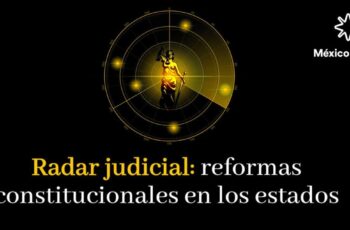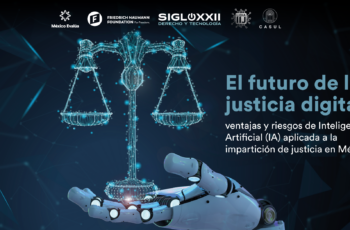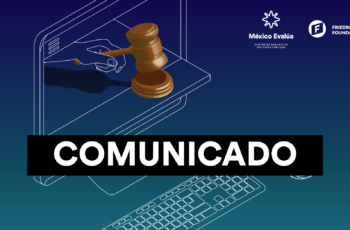There is no turning back for digital justice
By Laurence Pantin (@lpantin) | Proceso
The users of the justice system face a very complex situation. As a result of the covid-19 pandemic, the judicial powers had to suspend most of the services they normally offer, and they made the decision to focus only on the most urgent matters —in criminal matters, when the freedom of the people is at stake, and when it came to serious crimes; in family matters, regarding alimony and violence against women and minors—[1]. However, the demand for justice never stops and, in fact, in times of crisis like the one we are experiencing, it even increases. It is possible that the contingency leaves a large balance of lawsuits before the courts, just for successions, debts, divorces, alimony lawsuits or cases of domestic violence, among others.
For this reason, the judicial powers have sought to gradually reactivate the services they offer in this contingency and, without a doubt, those that have been able to do so have made use, to a greater extent, of technological solutions that were already used, others have expanded the functionalities of existing tools and also some new ones. These efforts range from the provision of telephone lines, email addresses or platforms for requesting appointments for proceedings, carrying out certain procedures or consulting files, to the promotion of online courts, through the creation of offices of virtual parties, the implementation of electronic files, the establishment of virtual courts or the authorization to hold hearings through videoconferences.
The problem is that, by expanding the procedures and stages of the processes that can be carried out digitally, in most cases the judicial powers do not have the regulations that support the implementation of these innovations. This implies that the efforts made by some powers to resume at least part of their activities digitally may be undermined by the possibility that some lawyers promote the annulment of some processes, arguing that the form and means in which were carried out were illegal, as they did not have the legal basis that traditional processes have. This was warned by several of the speakers in the series of webinars that we organized last week in México Evalúa, on the subject of digital justice in the country. It is worth summarizing here the main conclusions.
The perception of a Kafkaesque situation permeated many of the discussions. The constitutional reform of September 15th, 2017 gave the Congress of the Union the power to issue a single code on civil and family procedural matters and its transitory provisions established that, while this text was approved —which should happen in a period not exceeding 180 days—, the civil and family procedural legislation of the Federation and the states would remain in force. The issue is that the federal Congress has not yet issued the long-awaited National Code of Civil and Family Procedures, leaving local congresses with their hands tied to reform local regulations on the matter, since this would imply an invasion of the exclusive power of the Congress of the Union, as resolved by the Supreme Court on two occasions[2].
This impasse, which prevents the legislative powers from supporting the efforts of the judicial powers to explore the digital route, is what motivated, among other things, the president of the Justice Commission of the Chamber of Deputies, Pilar Ortega, to present an initiative of the National Code of Civil and Family Procedures on June 3rd, as she herself commented in one of our webinars. It is a very interesting text, which foresees not only the possibility of using digital means in certain parts of the processes, but also the transition to orality of civil and family matters.
However, even though it is necessary to update the regulations in accordance with the new reality, as Hilda Servín, general director of the Institute of the Public Defender of the State of Mexico pointed out, this legislative proposal, which in other times would have been well received , today presents great challenges, since it would require significant investments for the construction of orality chambers at a time when the judiciary must absorb labor justice[3], said Antonio Gutiérrez, advisor to the judiciary of the Judicial Branch of Nuevo León. Additionally, it is difficult for the judicial powers to aspire to obtain additional resources to make these investments, since there is an unprecedented economic crisis, which will affect the budget available for the next fiscal year and possibly in the longer term.
We are still far from being able to count on digital justice in Mexico. Beyond the regulatory or budgetary challenges, the lack of Internet access for a large part of the population still makes it difficult to imagine that we can achieve it in the short or medium term.
For his part, Ricardo Sodi, presiding magistrate of the Superior Court of Justice of the State of Mexico, pointed out that some procedures enabled digitally in the Mexican Judicial Power —such as online civil and family courts, for example— are not contemplated in the initiative, so this could imply a setback. The magistrate called on legislators not to equate all judicial powers downwards and to take into account the different degrees of technological advance that each one may have.
The good news is that deputy Ortega announced that this text and other initiatives from other parliamentary groups who are working on the same issue may be discussed, commented on and improved through an open parliament mechanism[4].
The participation of Fabiana Estrada, coordinator of advisors to the presidency of the Supreme Court, was also very relevant. She explained that the measures taken by the Supreme Court to allow digital processing of all trials under its jurisdiction; and by the Federal Judiciary Council to authorize that all trials under the Federal Judiciary can be carried out online and through videoconferences, were the result of an effort to modernize the Federal Judicial Branch that began before the pandemic[5].
In the same way, the announcements of José Antonio Ortega, presiding magistrate of the Superior Court of Justice of Querétaro, and counselor Gutiérrez of the Judicial Branch of Nuevo León, regarding the resumption of procedural deadlines and terms in all matters, were highlighted, thanks to the development of different digital tools.
However, we are still far from being able to count on digital justice in Mexico. Beyond the regulatory or budgetary challenges that we have already mentioned, the lack of internet access for a large part of the population still makes it difficult to imagine that we could achieve it in the short or medium term, said Viridiana Valgañón, trial attorney at EQUIS Justice for Women. For this reason, she warned that the process of digitalizing justice must be careful and well planned, so that it effectively expands access to justice and does not end up contributing to closing it even more for groups in situations of vulnerability and marginalization, such as certain indigenous communities that often do not have computers or internet access. She also considered it important that the platforms developed are inclusive and allow their use by people with disabilities or who speak an indigenous language.
The protection of the personal data of the users of the digital tools developed by the judicial powers must also be taken into account. It is the only way the different justice system users would trust these mechanisms, as Hilda Servín underlined.
Another obstacle to the transformation of justice comes from the resistance of the lawyers themselves, said lawyer Xavier Cortina; not only because they sometimes feel intimidated by new technologies, but also because some consider that faster and more efficient justice would prevent them from charging their clients for certain services. For this reason, a change of mentality is essential, stressed the partner of the Quijano, Cortina y de la Torre office.
In this regard, Omar Espino Zarazúa, secretary of the College of Trial Lawyers of Querétaro, asserted that it is necessary for lawyers to share technological implementations with their clients, allowing for greater transparency in the processes.
For this reason, José Mario de la Garza, president of Renace San Luis Potosí, considered it necessary to rethink the entire practice of law from schools. He also pointed out that the digitalization of justice cannot be reduced to investing in new technologies to inject them into a flawed system, but that it is first necessary to rethink the system and the processes of administering justice so that technology allows them to be improved.
Therefore, the current contingency represents a watershed, according to Judge Ortega from Querétaro. In the judicial powers in Mexico, “we could establish an AC and in DC, a time before the coronavirus and a time after the coronavirus,” he said. Before the coronavirus, the judiciary was in a comfort zone. After the coronavirus, they had no choice but to modernize.
[1] This is at the local level, with notable exceptions, such as the Judicial Branch of Nuevo León, which considered urgent matters in all areas. At the federal level, the urgent issues were criminal and amparo issues.
[2] Two decisions of the SCJN invalidated reforms to the civil and family procedural legislation of Coahuila and Aguascalientes approved after the constitutional reform in question, arguing that the states lack the power to legislate on the subject.
[3] The first 10 judicial powers must open courts in this matter as of October and all will have to do so, in different stages, by 2023.
[4] Therefore, the approval process of the National Code is likely to take time. However, the judicial powers are going to have to physically resume their activities and it is likely that the courts will be full and could be sources of contagion, if nothing is done to promote the use of new technologies. For this reason, perhaps it would be worth exploring the possibility of the Congress of the Union approving a General Law on this issue, taking advantage of section XVII of article 73 of the Constitution, which gives it the power to enact laws on information technologies, with the objective to give certainty about the online processes that are being carried out by the judicial powers and set clear rules for them regarding the principles of democratic justice systems: respect for due process, independence, transparency and accountability. An exercise of this nature should take into account the particular realities and the autonomy of each judiciary, without imposing excessive demands on some or setting back others.
[5] He also specified that the matters that began to be processed physically could migrate to the new online trial modality.









